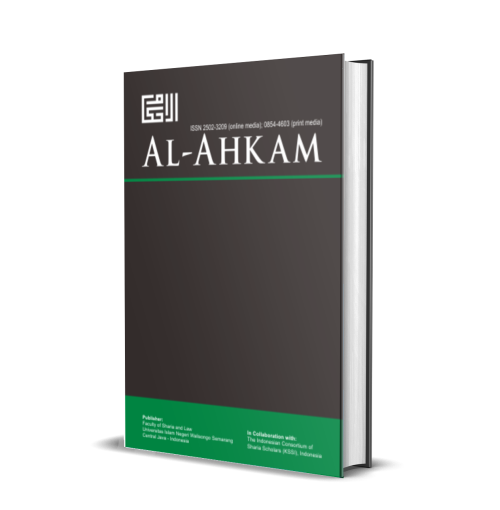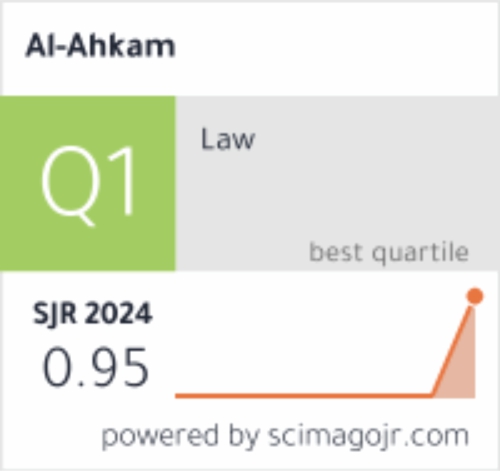Fiqh of Civilization in Building a Legal State: The Relevance of Muhammad Arkoun's Thought
DOI:
https://doi.org/10.21580/ahkam.2023.33.2.16643Keywords:
fiqh of civilization, Muhammad Arkoun, political state, rule of lawAbstract
Arkoun's political concept is very relevant to the expected idea of civilizational fiqh to resolve social problems nationally and internationally. The purpose of this article is to discuss the fiqh of civilization as an element of the rule of law which is connected with the political thought of state administration Muhammad Arkoun which is based on Islamic values in a legal state. Fiqh of civilization is a major breakthrough in building a legal state in analyzing current problems in the country and the world. This research uses the method qualitative with a conceptual approach by applying and studying thinking Muhammad Arkoun about the political concept of state administration based on values Islam through his works. This research contains the concept of political state; Muhammad Arkoun emphasized the importance of broadening the view of sources of Islamic law and contextual interpretation of Islamic law. Arkoun emphasized that state politics in Islam is more focused on the unity of the people, including religion and state. This aspect is currently being developed through fiqh concepts of civilization. Arkoun's critical thinking can help face the challenges of modernization and globalization in the Islamic world, which are reviewed in building a legal state according to the concept of Islamic statecraft.
Downloads
References
'Ali, Abdullah Yusuf. The Holy Qur’an: Text, Translation and Commentary. New York: Tahrike Tarsile Qur’an, 1977.
'Ali, Abdullah Yusuf. The Meaning of the Holy Qur’an. Beltsville, MD: Amana Publications, 1995.
Aminrazavi, Mehdi Amin Razavi, and Seyyed Hossein Nasr. The Islamic Intellectual Tradition in Persia. London: Routledge, 2015.
Arkoun, Mohammed. Islam: To Reform or to Subvert? Vol. 7. London: Saqi Essentials, 2012.
Arkoun, Mohammed. Rethinking Islam: Common Questions, Uncommon Answers. Edited and translated by Robert D. Lee. Michigan: Westview Press, 1994.
Arkoun, Mohammed. The Unthought in Contemporary Islamic Thought. London: Saqi Essentials, 2002.
Arkoun, Muhammad. Dinamika Intelektual Islam: Kritik terhadap Konsep Tradisi. Jakarta: Rajawali Pers, 2009.
Arkoun, Muhammad. Islam dan Determinisme Sejarah. Yogyakarta: Yayasan Pustaka Obor Indonesia, 2008.
Arkoun, Muhammad.. Ketika Wacana Bertemu: Perjumpaan Pemikir Muslim Abad ke-2 dan ke-20. Yogyakarta: Pustaka Pelajar, 2002.
Asad, Talal, Wendy Brown, Judith Butler, and Saba Mahmood. Is Critique Secular? Blasphemy, Injury, and Free Speech. Fordham: Fordham University Press, 2013. https://doi.org/10.2307/j.ctt1c5cjtk.
Assyaukanie, Luthfi, and Tim Lindsey. “Islamic Law and Society: The Impact of Da’wa and Muslim Religious Politics on the Shāfiʿī School and Islamic Legal Discourse in Southeast Asia.” Islamic Law and Society 10, no. 3 (2003): 328–54.
Auda, Jasser. Maqasid al-Shari’ah as Philosophy of Islamic Law. London: International Institute of Islamic Thought (IIIT), 2014.
Azhar, Muhammad. “Relasi Agama dan Negara dalam Perspektif Mohammed Arkoun.” Hermeneia Jurnal Kajian Islam Interdisipliner 6, no. 1 (2007): 181–99.
Baderin, Mashood A. Islamic Legal Theory. London: Routledge, 2017. https://doi.org/10.4324/9781315251721.
Ennaji, Moha. “Islam and Political Reform in Morocco: The Failure of a Generation?” Mediterranean Politics 19, no. 2 (2014): 157–74.
Ennaji, Moha. “Women, Gender, and Politics in Morocco.” Social Sciences 5, no. 4 (2016): 75. https://doi.org/10.3390/socsci5040075.
Fadel, M. “Legal Pluralism in the Sharia State.” American University International Law Review 20, no. 4 (2005): 765–810.
Hashim, Ahmed S. “The Islamic State: From al‐Qaeda Affiliate to Caliphate.” Middle East Policy 21, no. 4 (2014): 69–83. https://doi.org/10.1111/mepo.12096.
Kamali, Mohammad Hashim. Islam and Civilisational Renewal: A Journey Devoted to Contemporary Issue and Policy Research. Special Issue: The Family Institutions in the Twenty-First Century-Ideals and Realities. Jakarta: Elex Media Komputindo, 2011.
Kamali, Mohammad Hashim. Principles of Islamic Jurisprudence. Cambridge: The Islamic Texts Society, 2003.
Kazim, S. M., and J. A. Sheikh. “Rule of Law in Islam: Concepts and Implementation.” International Journal of Humanities and Social Science Research 8, no. 1 (2018): 1–11.
Lathifah, Anthin. Genealogi Fiqh Jihad (Studi pada komunitas Yayasan Prasasti Perdamaian). Semarang: Lembaga Penelitian IAIN Walisongo Semarang, 2012.
Lathifah, Anthin, Abu Hapsin, Ahmad Rofiq, and M. Arief Hidayatullah. “The Construction of Religious Freedom in Indonesian Legislation: A Perspective of Maqāṣid Ḥifẓ al-Dīn.” Samarah: Jurnal Hukum Keluarga dan Hukum Islam 6, no. 1 (2022): 369–90. https://doi.org/10.22373/sjhk.v6i1.10957.
Latif, Mukhlis, Muhammad Mutawalli, and Zulhilmi Paidi. “Fiqh Peradaban and the Actualization of Religious and State Life in the Modern Society.” Fikrah: Jurnal Ilmu Aqidah dan Studi Keagamaan 11, no. 1 (2023): 151–75. https://doi.org/10.21043/fikrah.v11i1.22570.
Latif, Mukhlis, Muhammad Mutawalli, and Muhammad Saleh Tajuddin. “The Principle of God as State Morality: The Relevance of Islamic Politics Muhammad Iqbal.” Journal of Namibian Studies: History Politics Culture 34 (2023): 51–72. https://doi.org/10.59670/jns.v34i.989.
Latif, Mukhlis, Muhammad Mutawalli, Muhammad Saleh Tajuddin, and Sabara Sabara. “The Nature of the Position of Wilayatul Faqih in the Iran Islamic Constitutional System: The Essence of Ayatollah Khomeini’s Thoughts.” Res Militaris 12, no. 4 (2022): 2051–67. https://resmilitaris.net/menu-script/index.php/resmilitaris/article/view/2043.
al-Māwardī, Abu’l-Ḥasan ’Ali ibn Muḥammad ibn Ḥabīb al-Bashri al-Baghdādī. The Ordinances of Government: al-Aḥkām al-Sulṭāniyya w’al-Wilāyāt al-Dīniyya. Translated by Asadullah Yate. New York: Garnet Publishing, 2012.
Mukti, Abdul. Islam dan Konstitusi. Jakarta: Gema Insani Press, 2012.
Mutawalli, Muhammad, Maskun, Zainal Amin Ayub, Muhammad Saleh Tajuddin, and Harlida Abdul Wahab. “Legislative Elections: An Overview of Closed Proportional System.” Petita: Jurnal Kajian Ilmu Hukum dan Syariah 8, no. 2 (2023): 93–103. https://doi.org/10.22373/petita.v8i2.200.
Mutawalli, Muhammad, Andi Pangerang Moenta, and Muhammad Hasrul. “Kewenangan Partai Politik dalam Penarikan Dukungan Bakal Pasangan Calon Kepala Daerah.” Jurnal Al-Qadau: Peradilan dan Hukum Keluarga Islam 8, no. 1 (2021): 48–61. https://doi.org/10.24252/al-qadau.v8i1.18072.
Nyazee, Khan, and Imran Ahsan. The Fundamentals of Islamic Governance: A Contemporary Interpretation of the System of al-Shura. Herndon: International Institute of Islamic Thought, 2004.
Qadir, Abdul. “Religion and Governance in Islam.” Religion Compass 7, no. 11 (2013): 494–502.
Rofii, Ahmad. “Islam, Islamic Law and Constitution Making: International and Domestic Engagement in the Constitution-making Process in Afghanistan.” Mazahib 19, no. 1 (2020): 1–40. https://doi.org/10.21093/mj.v19i1.2142.
Said, Imam Ghazali. Ideologi Kaum Fundamentalis. Surabaya: Diantama, 1998.
Salim, Arskal. Contemporary Islamic Law in Indonesia: Sharia and Legal Pluralism. Edinburgh: Edinburgh University Press Ltd., 2015.
Salim GP, M. Arskal. “From Usul Fiqh to Legal Pluralism: An Autoethnography of Islamic Legal Thought.” Mazahib, 2020, 79–106. https://doi.org/10.21093/mj.v19i1.2414.
Scott, James C. “The Islamic State and the Politics of the Caliphate.” Perspectives on Terrorism 9, no. 4 (2015): 149–60.
Shahar, Ido. “Legal Pluralism and the Study of Shari’a Courts.” Islamic Law and Society 15, no. 1 (2008): 112–41. https://doi.org/10.1163/156851908X287280.
Shihab, M. Quraish. Tafsir al-Mishbah: Pesan, Kesan dan Keserasian al-Qur’an. Jakarta: Lentera Hati, 2016.
Subekti, Ahmad. “Negara Hukum (Rechtstaat) dalam Perspektif Islam.” Jurnal Ilmiah Ahwal Syakhshiyyah (JAS) 1, no. 1 (2019): 57–72. https://doi.org/10.33474/jas.v1i1.2730.
Sumarkan, Sumarkan. “Islam dan Politik Kenegaraan Perspektif Muhammad Arkoun.” Al-Daulah: Jurnal Hukum dan Perundangan Islam 2, no. 2 (2012): 119–38. https://doi.org/10.15642/ad.2012.2.2.119-138.
Tambunan, Sihol Farida. “Antara Islam dan Barat: Pandangan Mohammed Arkoun Mengenai Kemodernan.” Jurnal Masyarakat dan Budaya 5, no. 2 (2003): 76–92. https://doi.org/10.14203/jmb.v5i2.252.
Taufiq, Muh., Darmawati H., and Abdullah Abdullah. “Konsep Ijtihad (Studi atas Pandangan Muhammad Arkoun).” Sulesana: Jurnal Wawasan Keislaman 15, no. 1 (2021): 1–52. https://doi.org/10.24252/sulesana.v15i1.23599.
Thoriq, Ali bin Abdullah. Konsep Siyasah Syari’ah Politik Islam Abad 21. Jakarta: Rajawali Pers, 2014.
Wasyi, Abdul. “Konsep Negara dan Hukum dalam Perspektif Siyasah Syariah.” Jurnal al-Ijtihad 8, no. 1 (2016): 23–34.
Wiryono, S. “Negara Kesatuan dan Persatuan Nasional.” El Muhasaba: Jurnal Akuntansi, Pajak dan Bisnis 9, no. 2 (2018): 132–42.
Zahrah, M. Abu. “The Islamic Concept of a State in Relation to the Western Concept.” American Journal of Islamic Social Sciences 19, no. 2 (2002): 109–23.
Downloads
Published
How to Cite
Issue
Section
License
By submitting an article to the journal, the author(s) agree to transfer the published article's copyright to the journal, which will act as the publisher. This means the journal will have the right to publish the article in various forms, including reprints. The journal will maintain the publishing rights to the published articles.
In line with the license, authors and third parties (readers, researchers, and others) are allowed to share and adapt the material. In addition, the material must be given appropriate credit, provided with a link to the license, and indicated if changes were made. If authors remix, transform or build upon the material, authors must distribute their contributions under the same license as the original.



